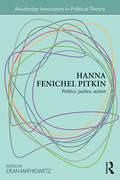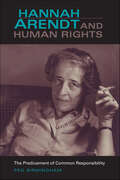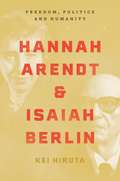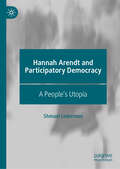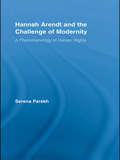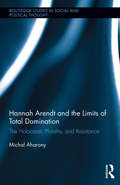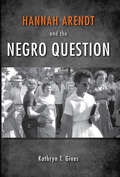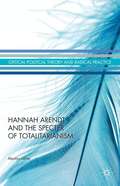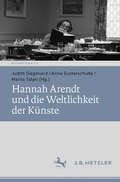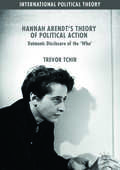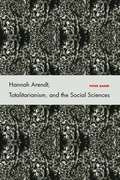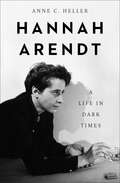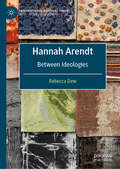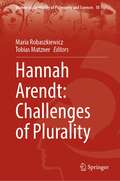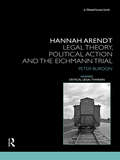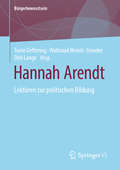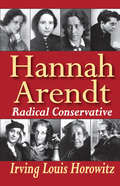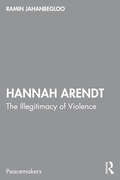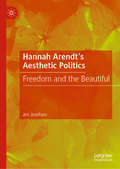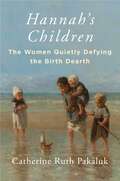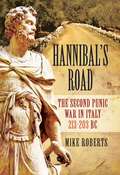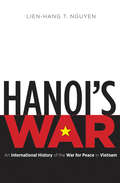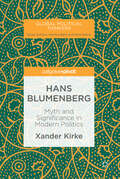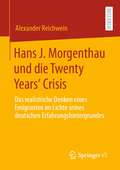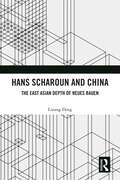- Table View
- List View
Hanna Fenichel Pitkin: Politics, Justice, Action (Routledge Innovators in Political Theory)
by Dean MathiowetzHanna Fenichel Pitkin has made key contributions to the field of political philosophy, pushing forward and clarifying the ways that political theorists think about action as the exercise of political freedom. In so doing, she has offered insightful studies of the problems of modern politics that theorists are called to address, and has addressed them herself in a range of theoretical genres.. This collection of her works approaches each of these dimensions of Pitkin’s contributions in turn: The Modern Condition and the Impetus to Theorize: Pitkin has offered sustained reflection on what aspects of modern political life prompt the impulse to theorize politics. Highlighting the pitfalls that modern life and philosophy also present for that enterprise, she suggests an agenda for political theorizing that engages the dilemmas of modernity in ways that grasp the importance of paradox as a portal of insight into the modern condition, and eschews attempts at easy resolution. Moral Philosophy, Judgment, Justice: Pitkin has turned at several points in her career to the concept of justice as one that particularly brings together questions of agency and responsibility, the insights of moral philosophy, and judgment. Drawing upon a variety of methodological resources and theoretical inspirations, her work engages ordinary language philosophy, pedagogical practice, and textual study, to yield a complex and subtle set of observations, all of which open moral philosophy and matters of judgment to questions of action and responsibility in the exercise of political freedom. Action: Political agency and its obstacles are a key theme in Pitkin’s work and a main area of her theoretical innovation. She has examined the appeal of autonomy as a picture of political agency, explored the ways that the institutional arrangements of modern liberal societies attempt to link of individual and political agency and offered a picture of political freedom as maintaining the tension between individual "parts" and collective "wholes," Finally, Pitkin has meditated on the political and social conditions that most impede our ability to grasp agency as a practice of political freedom, and gestured to paths that may lead forward.
Hannah Arendt and Human Rights: The Predicament of Common Responsibility (Studies in Continental Thought)
by Peg BirminghamHannah Arendt's most important contribution to political thought may be her well-known and often-cited notion of the "right to have rights." In this incisive and wide-ranging book, Peg Birmingham explores the theoretical and social foundations of Arendt's philosophy on human rights. Devoting special consideration to questions and issues surrounding Arendt's ideas of common humanity, human responsibility, and natality, Birmingham formulates a more complex view of how these basic concepts support Arendt's theory of human rights. Birmingham considers Arendt's key philosophical works along with her literary writings, especially those on Walter Benjamin and Franz Kafka, to reveal the extent of Arendt's commitment to humanity even as violence, horror, and pessimism overtook Europe during World War II and its aftermath. This current and lively book makes a significant contribution to philosophy, political science, and European intellectual history.
Hannah Arendt and Isaiah Berlin: Freedom, Politics and Humanity
by Kei HirutaFor the first time, the full story of the conflict between two of the twentieth century’s most important thinkers—and how their profound disagreements continue to offer important lessons for political theory and philosophyTwo of the most iconic thinkers of the twentieth century, Hannah Arendt (1906–1975) and Isaiah Berlin (1909–1997) fundamentally disagreed on central issues in politics, history and philosophy. In spite of their overlapping lives and experiences as Jewish émigré intellectuals, Berlin disliked Arendt intensely, saying that she represented “everything that I detest most,” while Arendt met Berlin’s hostility with indifference and suspicion. Written in a lively style, and filled with drama, tragedy and passion, Hannah Arendt and Isaiah Berlin tells, for the first time, the full story of the fraught relationship between these towering figures, and shows how their profoundly different views continue to offer important lessons for political thought today.Drawing on a wealth of new archival material, Kei Hiruta traces the Arendt–Berlin conflict, from their first meeting in wartime New York through their widening intellectual chasm during the 1950s, the controversy over Arendt’s 1963 book Eichmann in Jerusalem, their final missed opportunity to engage with each other at a 1967 conference and Berlin’s continuing animosity toward Arendt after her death. Hiruta blends political philosophy and intellectual history to examine key issues that simultaneously connected and divided Arendt and Berlin, including the nature of totalitarianism, evil and the Holocaust, human agency and moral responsibility, Zionism, American democracy, British imperialism and the Hungarian Revolution. But, most of all, Arendt and Berlin disagreed over a question that goes to the heart of the human condition: what does it mean to be free?
Hannah Arendt and Participatory Democracy: A People's Utopia
by Shmuel LedermanThis book centers on a relatively neglected theme in the scholarly literature on Hannah Arendt's political thought: her support for a new form of government in which citizen councils would replace contemporary representative democracy and allow citizens to participate directly in decision-making in the public sphere.The main argument of the book is that the council system, or more broadly the vision of participatory democracy was far more important to Arendt than is commonly understood. Seeking to demonstrate the close links between the council system Arendt advocated and other major themes in her work, the book focuses particularly on her critique of the nation-state and her call for a new international order in which human dignity and “the right to have rights” will be guaranteed; her conception of “the political” and the conditions that can make this experience possible; the relationship between philosophy and politics; and the challenge of political judgement in the modern world.
Hannah Arendt and the Challenge of Modernity: A Phenomenology of Human Rights
by Serena ParekhHannah Arendt and the Challenge of Modernity explores the theme of human rights in the work of Hannah Arendt. Parekh argues that Arendt's contribution to this debate has been largely ignored because she does not speak in the same terms as contemporary theoreticians of human rights. Beginning by examining Arendt’s critique of human rights, and the concept of "a right to have rights" with which she contrasts the traditional understanding of human rights, Parekh goes on to analyze some of the tensions and paradoxes within the modern conception of human rights that Arendt brings to light, arguing that Arendt’s perspective must be understood as phenomenological and grounded in a notion of intersubjectivity that she develops in her readings of Kant and Socrates.
Hannah Arendt and the Limits of Total Domination: The Holocaust, Plurality, and Resistance (Routledge Studies in Social and Political Thought)
by Michal AharonyResponding to the increasingly influential role of Hannah Arendt’s political philosophy in recent years, Hannah Arendt and the Limits of Total Domination: The Holocaust, Plurality, and Resistance, critically engages with Arendt’s understanding of totalitarianism. According to Arendt, the main goal of totalitarianism was total domination; namely, the virtual eradication of human legality, morality, individuality, and plurality. This attempt, in her view, was most fully realized in the concentration camps, which served as the major "laboratories" for the regime. While Arendt focused on the perpetrators’ logic and drive, Michal Aharony examines the perspectives and experiences of the victims and their ability to resist such an experiment. The first book-length study to juxtapose Arendt’s concept of total domination with actual testimonies of Holocaust survivors, this book calls for methodological pluralism and the integration of the voices and narratives of the actors in the construction of political concepts and theoretical systems. To achieve this, Aharony engages with both well-known and non-canonical intellectuals and writers who survived Auschwitz and Buchenwald concentration camps. Additionally, she analyzes the oral testimonies of survivors who are largely unknown, drawing from interviews conducted in Israel and in the U.S., as well as from videotaped interviews from archives around the world. Revealing various manifestations of unarmed resistance in the camps, this study demonstrates the persistence of morality and free agency even under the most extreme and de-humanizing conditions, while cautiously suggesting that absolute domination is never as absolute as it claims or wishes to be. Scholars of political philosophy, political science, history, and Holocaust studies will find this an original and compelling book.
Hannah Arendt and the Negro Question
by Kathryn T. GinesWhile acknowledging Hannah Arendt's keen philosophical and political insights, Kathryn T. Gines claims that there are some problematic assertions and oversights regarding Arendt's treatment of the "Negro question." Gines focuses on Arendt's reaction to the desegregation of Little Rock schools, to laws making mixed marriages illegal, and to the growing civil rights movement in the south. Reading them alongside Arendt's writings on revolution, the human condition, violence, and responses to the Eichmann war crimes trial, Gines provides a systematic analysis of anti-black racism in Arendt's work.
Hannah Arendt and the Specter of Totalitarianism
by Marilyn LafayThis work positions Arendt as a political writer attempting to find a way in which humanity, poised between the Holocaust and the atom bomb, might reclaim its position as the creators of a world fit for human habitation.
Hannah Arendt und die Weltlichkeit der Künste (Ästhetiken X.0 – Zeitgenössische Konturen ästhetischen Denkens)
by Anne Eusterschulte Judith Siegmund Marita TatariHannah Arendt hat kein spezifisch kunstphilosophisches Buch geschrieben. Jedoch spielen ihre Überlegungen zu den Künsten und mehr noch die kulturgeschichtliche Verortung von produktions- und rezeptionsästhetischen Fragen eine wichtige Rolle in ihrem Werk. Der Band legt den Fokus auf kunstphilosophische Konzepte und Reflexionen in den Texten Arendts und bringt diese sowohl mit ihrer politischen Theorie als auch mit aktuellen Fragen künstlerischer Praxis in Zusammenhang. Entsprechend werden zentrale Aspekte von Arendts kunstrelevanter Begrifflichkeit thematisiert: So etwa das künstlerische „Herstellen“, das ästhetische „Urteilen“, die „Dingheit“ und „Verdinglichung“ der Kunstwerke und damit einhergehend die „weltliche“ und „zwischenmenschliche“ Dimension ihrer Gegenständlichkeit. Aus der Perspektive dieser Überlegungen zu Kunst und Künsten werden nicht nur Arendts Verständnis des Öffentlichen und des Privaten neu diskutiert, sondern ebenso ihre Konzepte von „Dauerhaftigkeit“, „Sprachlichkeit“, „Wahrhaftigkeit“ und „Geschichtlichkeit“. Vor diesem Hintergrund wird schließlich auch nach dem Verhältnis der unterschiedlichen Künste im Hinblick auf ihre konstitutive Weltlichkeit gefragt.
Hannah Arendt's Theory of Political Action
by Trevor TchirThis book presents an account of Hannah Arendt's performative and non-sovereign theory of freedom and political action, with special focus on action's disclosure of the unique 'who' of each agent. It aims to illuminate Arendt's critique of sovereign rule, totalitarianism, and world-alienation, her defense of a distinct political sphere for engaged citizen action and judgment, her conception of the 'right to have rights,' and her rejection of teleological philosophies of history. Arendt proposes that in modern, pluralistic, secular public spheres, no one metaphysical or religious idea can authoritatively validate political actions or opinions absolutely. At the same time, she sees action and thinking as revealing an inescapable existential illusion of a divine element in human beings, a notion represented well by the 'daimon' metaphor that appears in Arendt's own work and in key works by Plato, Heidegger, Jaspers, and Kant, with which she engages. While providing a post-metaphysical theory of action and judgment, Arendt performs the fact that many of the legitimating concepts of contemporary secular politics retain a residual vocabulary of transcendence. This book will be of interest not only to Arendt scholars, but also to students of identity politics, the critique of sovereignty, international political theory, political theology, and the philosophy of history.
Hannah Arendt, Totalitarianism, and the Social Sciences
by Peter BaehrBaehr (social theory, Lingman U. , Hong Kong) critically reviews the debates between Hannah Arendt and her critics in the social sciences over her theory of totalitarianism and her critique of social science as being fundamentally unable to account for totalitarianism. Specifically, he examines the encounters between: Arendt and David Riesman over the limits of totalitarianism, Arendt and Raymond Aron over his idea that totalitarianism could be explained as an amplification of revolutionary ideology and violence, and Arendt and Jules Monnerot about the nature of "political religion. " He also addresses some of the theoretical implications of these debates for thinking about Islamic fundamentalism. Annotation ©2010 Book News, Inc. , Portland, OR (booknews. com)
Hannah Arendt: A Life in Dark Times
by Anne C HellerThe acclaimed biographer presents &“a perceptive life of the controversial political philosopher&” and author of Eichmann in Jerusalem (Kirkus Reviews). Hannah Arendt was a polarizing cultural theorist—extolled by her peers as a visionary and berated by her critics as a poseur and a fraud. Born in Prussia to assimilated Jewish parents, she escaped from Hitler&’s Germany in 1933. Arendt is now best remembered for the storm of controversy that surrounded her 1963 New Yorker series on the trial of Adolf Eichmann, a kidnapped Nazi war criminal. Arendt&’s first book, The Origins of Totalitarianism, single-handedly altered the way generations around the world viewed fascism and genocide. Her most famous work, Eichmann in Jerusalem, created fierce debate that continues to this day, exacerbated by the posthumous discovery that she had been the lover of the philosopher and Nazi sympathizer Martin Heidegger. In this comprehensive biography, Anne C. Heller tracks the source of Arendt&’s contradictions and achievements to her sense of being a &“conscious pariah&”—one of those rare people who doesn&’t &“lose confidence in ourselves if society does not approve us&” and will not &“pay any price&” to gain the acceptance of others.
Hannah Arendt: Between Ideologies (International Political Theory)
by Rebecca DewThis book presents an incisive survey of twentieth-century transatlantic ideational exchange. The author argues that German-American political thinker Hannah Arendt is to be distinguished not only from the French side of the existentialist movement, but singled out from Heidegger on the German side, as well. The primary feature of Arendt’s existentialism is its practicality in political terms; its acknowledgment of the vital need for viable public spaces of vocalization, action and interaction; its recommendation of councils, constitutions and other structural foundations for the visible presentation of politics; and the applicability of her view of political action to her estimation of authentic human living. Drawing from the work of Karl Jaspers as her primary exemplar, conclusions are made as to the degree to which Arendt’s existentialism, thereby identified as atypical, is to be assessed as postmodern without going so far as to declare her intellectual bent postmodernist.
Hannah Arendt: Challenges of Plurality (Women in the History of Philosophy and Sciences #10)
by Maria Robaszkiewicz Tobias MatznerThis volume explores challenges posed by plurality, as understood by Hannah Arendt, but also the opportunities it offers. It is an interdisciplinary collection of chapters, including contributions from different traditions of philosophy, political science, and history. The book offers novel perspectives on central issues in research on Arendt, reconfiguring the existing interpretations and reinforcing the line of interpretation illuminating the phenomenological facets of Arendt’s theory. The authors of the contributions to this volume decisively put the notion of plurality in the center of the collected interpretations, pointing out that plurality in its dialectic form of commonality, and difference is not only, as assumed by default, one of the most important notions in Arendt’s theory, but the very central one. At the same time, plurality is a central issue in many current debates, from populism and hate speech to migration and privacy. This collection therefore connects the theoretical advancements regarding Arendt and other political thinkers with some of the most pressing contemporary issues. This book will be of interest to scholars and advanced students from philosophy, political theory and related fields studying contemporary challenges of plurality as well as scholars interested in the work of Hannah Arendt.
Hannah Arendt: Legal Theory and the Eichmann Trial (Nomikoi: Critical Legal Thinkers)
by Peter BurdonHannah Arendt is one of the great outsiders of twentieth-century political philosophy. After reporting on the trial of Nazi war criminal Adolf Eichmann, Arendt embarked on a series of reflections about how to make judgments and exercise responsibility without recourse to existing law, especially when existing law is judged as immoral. This book uses Hannah Arendt’s text Eichmann in Jerusalem to examine major themes in legal theory, including the nature of law, legal authority, the duty of citizens, the nexus between morality and law and political action.
Hannah Arendt: Lektüren zur politischen Bildung (Bürgerbewusstsein)
by Dirk Lange Tonio Oeftering Waltraud Meints-StenderHannah Arendts Philosophie des Politischen ist in der zweiten Hälfte des 20. Jahrhunderts zum Klassiker avanciert. Ihr emphatischer Begriff des Politischen wird in der Sozialphilosophie und in der politischen Theorie kontrovers debattiert. In jüngster Vergangenheit ist auch in der politischen Bildung eine deutliche Zunahme der Arendt Rezeption zu verzeichnen, in der auf ganz unterschiedliche Weise auf ihre Schriften Bezug genommen wird. Die Autorinnen und Autoren dieses Bandes nehmen dies zum Anlass, bildungspolitische Zugänge und Lektüren von Hannah Arendts Schriften zu präsentieren, um damit ihren grundlagentheoretischen Beitrag zur politischen Bildung zu erfassen.Mit Beiträgen von Fred Dewey, Jerome Kohn, Wolfgang Heuer, Ingo Juchler, Dirk Lange, Bettina Lösch, Helgard Mahrdt, Waltraud Meints-Stender, Ingeborg Nordmann, Tonio Oeftering und Elisabeth Young-Bruehl
Hannah Arendt: Radical Conservative
by Irving HorowitzHannah Arendt: Radical Conservative paints a broad picture of the personal traits and professional achievements in the work of an extremely complex iconographic figure in twentieth-century intellectual life. Writing about Hannah Arendt is an exercise in the biographic intersecting with the academic. It is an effort to bring together contexts of work with contents of thought. This volume was written in response to continuing interest in her work and also to the bitter and sometimes emotional attacks of her toughest critics. Horowitz emphasizes her unique contributions to political philosophy.Hannah Arendt has been described in many ways. She has been called a feminist, a dedicated worker for and writer about Jewish causes, a German advocate of its highest aspirations and assumed superiority to just about any other linguistic and national tradition, and a person whose very name is identified with anti-Nazism. Irving Louis Horowitz conveys the passion Hannah Arendt's scholarship has elicited as well as the diversity of her writings.Hannah Arendt's career is a lesson in the life of the human mind. Her reflections on our political universe are both interesting and compelling. Those who identify themselves firmly within a single tradition or culture may escape the problem of relativism, but they also suffer the problem of absolutism. This long-standing tension between traditions, cultures, and systems is what Horowitz has taken from Arendt's writings. Her sense of nuance has made her a compelling figure in twentieth-century ideas and a controversial voice well into the twenty-first century.
Hannah Arendt: The Illegitimacy of Violence (Peacemakers)
by Ramin JahanbeglooThis book presents an original understanding of Arendt in the context of comparative political theory. The author discusses Arendt’s acute and perceptive view of violence as well as practical applications of her thought in a comparative context.The book examines Hannah Arendt’s ideas about politics and violence provoked by the horrors of totalitarianism. It applies the rich potential of Arendt’s insights to the wider cultural context and discourse of nonviolence. Through case studies of India and Iran, it presents a new way of reading Arendt’s understanding and critique of violence beyond the simple analysis of her work on power and violence.An original, nuanced and meaningful guide to Hannah Arendt, the book will be essential reading for students and scholars in politics, philosophy and peace and conflict studies.
Hannah Arendt’s Aesthetic Politics: Freedom and the Beautiful
by Jim JosefsonWe face a crisis of public reason. Our quest for a politics that is free, moral and rational has, somehow, made it hard for us to move, to change our positions, to visit places and perspectives that are not our own, and to embrace reality. This book addresses this crisis with a model of public reason based in a new aesthetic reading of Hannah Arendt’s political theory. It begins by telling the story of Arendt’s engagement with the Augenblicke of Nietzsche, Kierkegaard, Jaspers, Heidegger, Kafka and Benjamin, in order to identify her own aesthetic Moment. Josefson then explicates this Moment, what he calls the freedom of the beautiful, as a third face of freedom on par with Arendt’s familiar freedoms of action and the life of the mind. He shows how this freedom, rooted in Jaspers’s phenomenology and a non-metaphysical reading of Kant, serves to redress the world-alienation that was a uniting theme across Arendt’s works. Ultimately, this volume aims to challenge orthodox accounts of Arendtian politics, presenting Arendt’s aesthetic politics as a radically new model of republicanism and as an alternative to political liberal, deliberative and agonistic models of public reason.
Hannah's Children: The Women Quietly Defying the Birth Dearth
by Catherine PakalukA portrait of America's most interesting yet overlooked women.In the midst of a historic "birth dearth," why do some 5 percent of American women choose to defy the demographic norm by bearing five or more children? Hannah&’s Children is a compelling portrait of these overlooked but fascinating mothers who, like the biblical Hannah, see their children as their purpose, their contribution, and their greatest blessing. The social scientist Catherine Pakaluk, herself the mother of eight, traveled across the United States and interviewed fifty-five college-educated women who were raising five or more children. Through open-ended questions, she sought to understand who these women are, why and when they chose to have a large family, and what this choice means for them, their families, and the nation. Hannah&’s Children is more than interesting stories of extraordinary women. It presents information that is urgently relevant for the future of American prosperity. Many countries have experimented with aggressively pro-natalist public policies, and all of them have failed. Pakaluk finds that the quantitative methods to which the social sciences limit themselves overlook important questions of meaning and identity in their inquiries into fertility rates. Her book is a pathbreaking foray into questions of purpose, religion, transcendence, healing, and growth—questions that ought to inform economic inquiry in the future.
Hannibal's Road: The Second Punic War in Italy, 213–203 BC
by Mike RobertsMany books have been written on the Second Punic War and Hannibal in particular but few give much space to his campaigns in the years from 213 203 BC. Most studies concentrate on Hannibals series of stunning victories in the early stages of the war, culminating at Cannae in 216 BC, then refocus on the activities of his nemesis ,Scipio Africanus, in Spain until the two meet in the final showdown at Zama. But this has led to the neglect of some of the Carthaginian genius most remarkable campaigns. By 212 the wider war was definitely going against the Carthaginians. Yet Hannibal, despite being massively outnumbered and with little support from home, was able to sustain his polyglot army and campaign actively across southern Italy for another ten years. His skilful manoeuvring and victory in numerous engagements kept several veteran armies of the normally aggressive Romans tied up and on the defensive, until Scipios invasion of North Africa pulled him home to defend Carthage. Mike Roberts follows the course of these remarkable events in detail, analysing Hannibals strategy and aims in this phase of the war and revealing a genius that had lost none of its lustre in adversity.
Hanoi's War
by Lien-Hang T. NguyenWhile most historians of the Vietnam War focus on the origins of U.S. involvement and the Americanization of the conflict, Lien-Hang T. Nguyen examines the international context in which North Vietnamese leaders pursued the war and American intervention ended. This riveting narrative takes the reader from the marshy swamps of the Mekong Delta to the bomb-saturated Red River Delta, from the corridors of power in Hanoi and Saigon to the Nixon White House, and from the peace negotiations in Paris to high-level meetings in Beijing and Moscow, all to reveal that peace never had a chance in Vietnam.Hanoi's War renders transparent the internal workings of America's most elusive enemy during the Cold War and shows that the war fought during the peace negotiations was bloodier and much more wide ranging than it had been previously. Using never-before-seen archival materials from the Vietnam Ministry of Foreign Affairs, as well as materials from other archives around the world, Nguyen explores the politics of war-making and peace-making not only from the North Vietnamese perspective but also from that of South Vietnam, the Soviet Union, China, and the United States, presenting a uniquely international portrait.
Hans Blumenberg: Myth And Significance In Modern Politics (Global Political Thinkers Ser.)
by Xander KirkeThis book investigates the writings of German intellectual historian and philosopher Hans Blumenberg. While Blumenberg was not an explicitly political thinker and remains relatively under-explored in Anglophone academia, this project demonstrates that his work makes a valuable contribution to political science. The author considers the intellectual contributions Blumenberg makes to a variety of themes focusing primarily on myth. Rather than seeing myths in a pejorative sense, as primitive modes of thought that have been overcome, Blumenberg reveals that myths are crucial to dealing with the existential anxieties we face. When we trace his thought as it developed throughout his life, we find a rich source of philosophical insights that could enhance our understandings of politics today.
Hans J. Morgenthau und die Twenty Years‘ Crisis: Das realistische Denken eines Emigranten im Lichte seines deutschen Erfahrungshintergrundes
by Alexander ReichweinAlexander Reichwein stellt in diesem Buch die realistische Theorie Hans J. Morgenthaus in den Kontext der deutschen Geschichte. Dabei vertritt er die These eines sinnstiftenden Zusammenhangs zwischen der Sozialisation und dem Denken des in Frankfurt promovierten Völkerrechtlers und späteren Politikwissenschaftlers. Reichwein argumentiert, dass erst das Wissen um Morgenthaus soziales und intellektuelles Umfeld, seinen persönlichen und akademischen Werdegang und die politischen Ereignisse in Europa in den Zwischenkriegsjahren den Schlüssel zum Verständnis seines Weltbildes bieten, das sich nicht auf ein affirmatives Verständnis von Macht reduzieren lässt. Morgenthaus Denken offenbart liberale Grundüberzeugungen, einen normativen Kern und Lehren aus der Vergangenheit, die in seiner Kritik an der US-Außenpolitik sowie in seinen Arbeiten zur Demokratie in Amerika zum Ausdruck kommen. Und die sich wie eine Warnung vor einer kriegerischen Außenpolitik, Nationalismus und einem zweiten Weimar lesen lassen.
Hans Scharoun and China: The East Asian Depth of Neues Bauen
by Liyang DingThis book presents the first systematic overview and analysis of the deep connection between Scharoun and China, offering insights into East-West cultural exchange and enriching existing understandings of modernism.The German architect Hans Scharoun has typically been pigeonholed as a leading figure in “expressionist” architecture. As this book shows, however, this understanding oversimplifies the multifaceted nature of Scharoun’s career and overlooks his central role within the tradition of Neues Bauen. The book begins with Scharoun’s early interactions with East Asian architects in the 1930s, his active involvement in the Chinese Werkbund (1941–42), and his extensive research on Chinese architecture and urban culture in the mid-1940s and 1950s. The book then examines Scharoun’s postwar architectural designs and urban planning projects, most notably the Kollektivplan, the Volksschule Darmstadt, and the Berliner Philharmonie, which incorporated original spatial and urbanistic concepts such as “Stadtlandschaft,” “Raum der Mitte,” and “aperspectival” space, inspired to varying degrees by Chinese architectural and urban planning traditions.The book will appeal to scholars and students of modern architecture, urban planning, and architectural theory, especially those interested in modernism and East-West cultural exchange.
